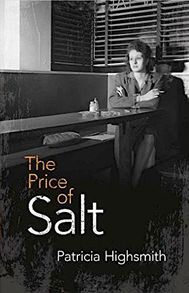A WRITER'S WIT |
My Book World

How many times have I read a book because first I saw the film (and yet how many times have I not)! The most recent example, Carol, starring Cate Blanchett in the titular role, inspired me to read the novel. I’ve read Highsmith’s work before: The Talented Mr. Ripley and Ripley Underground. I’m not sure, in spite of the awards won, that she’s ever been truly honored as a writer. The Price of Salt is not “just” a woman’s book or a “lesbian romance,” as some critics have suggested. The novel, originally published in 1952, portrays the story of two women who travel from New York to the West, and it heightens the ideal of love rather than diminishes it. Through its specificity of love between two women of a certain time period of a certain geography (ranging over two-thirds of the US), the novel creates a universality that is appealing across a vast number of readers.
Depending on whom you read or side with, Highsmith’s title bears a biblical reference. It may either refer to Lot’s wife or Matthew 5:13. I prefer to think it is the latter: “‘You are the salt of the earth; but if salt has lost its taste, how shall its saltness be restored. It is no longer good for anything except to be thrown out and trodden under foot by men.’” Could it be that Highsmith chooses to be quite specific, referring to Carol’s nefarious husband perhaps, when she suggests that a relationship without love might as well be stomped on by men? In chapter twenty-two Highsmith makes perhaps the most transparent reference to this idea of salt: “In the middle of the block, she opened the door of a coffee shop, but they were playing one of the songs she had heard with Carol everywhere, and she let the door close and walked on. The music lived, but the world was dead. And the song would die one day, she thought, but how would the world come back to life? How would its salt come back?” (225). Therese now believes that everything with Carol is over, but a small part of her also believes that the salt, the flavor, of their relationship shall in some way be restored. And she is right. The final paragraph, though it may be “romantic,” is certainly not sentimental (see below).
Some nuggets:
Therese senses a certain role she’s been playing with regard to Carol and their magical trip westward. “But at moments she felt like an actor, remembered only now and then her identity with a sense of surprise, as if she had been playing in these last days the part of someone else, someone fabulously and excessively lucky” (174).
“Therese squeezed the wheel, then deliberately relaxed. She sensed a tremendous sorrow hanging over them, ahead of them, that was just beginning to reveal the edge of itself, that they were driving into. She remembered the detective’s face and the barely legible expression that she realized now was malice. It was malice she had seen in his smile, even as he said he was on no side, and she could feel in him a desire that was actually personal to separate them, because he knew they were together. She had seen just now what she had only sensed before, that the whole world was ready to be their enemy, and suddenly what she and Carol had together seemed no longer love or anything happy but a monster between them, with each of them caught in a fist” (199).
“‘But the most important point I did not mention and was not thought of by anyone—that the rapport between two men or two women can be absolute and perfect, as it can never be between man and woman, and perhaps some people want just this, as others want that more shifting and uncertain thing that happens between men and women’” (221).
And here is the final paragraph I mentioned before: “She stood in the doorway, looking over the people at the tables in the room where a piano played. The lights were not bright, and she did not see her at first, half hidden in the shadow against the far wall, facing her. Nor did Carol see her. A man sat opposite here, Therese did not know who. Carol raised her hand slowly and brushed her hair back, once on either side, and Therese smiled because the gesture was Carol, and it was Carol she loved and would always love. Oh, in a different way now, because she was a different person, and it was like meeting Carol all over again, but it was still Carol and no one else. It would be Carol, in a thousand cities, a thousand houses, in foreign lands where they would go together, in heaven and in hell. Therese waited. Then as she was about to go to her, Carol saw here, seemed to stare at her incredulously a moment while Therese watched the slow smile growing, before her arm lifted suddenly, her hand waved a quick, eager greeting that Therese had never see before. Therese walked toward her” (248-9). Just like the film!

Introduction to My Long-Playing Records
"My Long-Playing Records" — The Story
"A Certain Kind of Mischief"
"Ghost Riders"
"The Best Mud"
"Handy to Some"
"Blight"
"A Gambler's Debt"
"Tales of the Millerettes"
"Men at Sea"
"Basketball Is Not a Drug"
"Engineer"
"Snarked"
"Killing Lorenzo"
"The Age I Am Now"
"Bathed in Pink"
Listen to My Long-Playing Records Podcasts:
"A Certain Kind of Mischief"
"The Best Mud"
"Handy to Some"
"Tales of the Millerettes"
"Men at Sea"
"My Long-Playing Records"
"Basketball Is Not a Drug"
"Snarked"
"Killing Lorenzo"
"Bathed in Pink"
Also available on iTunes.


 RSS Feed
RSS Feed